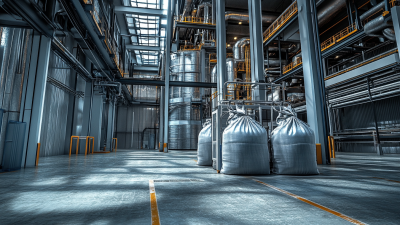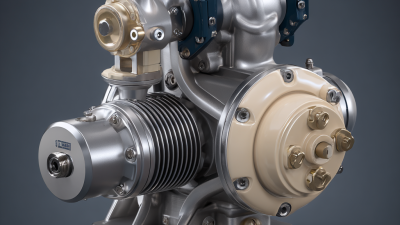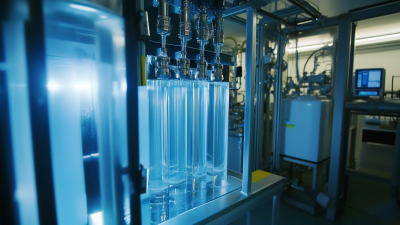Leave Your Message
Request a Quote
In today’s industrial landscape, maintaining air quality and efficiency is paramount, especially for businesses operating in sectors such as manufacturing, pharmaceuticals, and food processing. One critical aspect of this is the implementation of effective Bag Filtration systems. According to a report by the Environmental Protection Agency (EPA), poor air quality can lead to a decline in employee productivity by up to 10%, while also increasing the risk of respiratory issues, which affects workforce health and company liabilities. Furthermore, advanced filtration technologies have shown to reduce energy costs by more than 30%, highlighting their economic benefits. As industries strive to meet stricter environmental regulations and improve workplace conditions, investing in state-of-the-art Bag Filtration systems has become an essential strategy for not only compliance but also enhancing operational efficiency and safeguarding employee wellbeing.

Investing in advanced bag filtration systems offers numerous advantages for industrial applications, significantly enhancing operational efficiency and compliance with environmental standards. According to a recent report from the International Journal of Environmental Research and Public Health, businesses utilizing modern filtration technologies can see up to a 30% reduction in particulate emissions, leading to improved air quality and healthier work environments. This not only aligns with regulatory requirements but also boosts employee morale and productivity.
In practice, advanced bag filtration systems are designed to handle various industrial pollutants, effectively capturing particles as small as 0.3 microns. This level of efficiency is crucial, given that the U.S. Environmental Protection Agency (EPA) estimates that fine particulate matter is responsible for approximately 4,000 premature deaths annually. By implementing these systems, companies can mitigate health risks and reduce associated costs.
Tips: Regular maintenance of bag filtration systems can further enhance performance. Scheduling quarterly inspections can ensure that filters are operating at their best, preventing potential downtimes and costly repairs. Additionally, training staff on the importance of filtration can foster a culture of safety and compliance within the organization.
| Reason | Benefits | Impact on Operations | Cost Savings |
|---|---|---|---|
| Enhanced Air Quality | Reduces airborne contaminants, improving health and safety | Lower absenteeism due to illness | Reduced health insurance costs |
| Increased Efficiency | Optimizes filtration performance | Enhanced machinery lifespan | Lower maintenance costs |
| Compliance with Regulations | Meets environmental standards | Avoids fines and legal actions | Potential tax benefits for compliance |
| Sustainability | Supports eco-friendly practices | Enhances corporate image | May qualify for green incentives |
| Versatile Applications | Adaptable to various industrial processes | Wide use across sectors | Maximized equipment use |
| Cost-Effectiveness | Long-term savings through reduced operational costs | Improved ROI | Lower total cost of ownership |
| Improved Productivity | Less downtime from equipment failure | Higher output and efficiency | Increased profits from higher production rates |
Investing in advanced bag filtration systems can lead to significant cost savings for businesses by enhancing dust and emission control. These systems are designed to effectively capture airborne particles and prevent them from contaminating the workplace or being released into the environment. By minimizing the amount of dust and emissions, businesses can avoid costly fines for non-compliance with environmental regulations and improve their overall operational efficiency.
Moreover, advanced filtration technologies reduce maintenance costs associated with machinery and equipment. When dust accumulates on equipment, it can lead to malfunctions or decreased efficiency, resulting in expensive repairs and downtime. By ensuring cleaner air and less dust accumulation, businesses can extend the lifespan of their machinery, ultimately saving on replacement costs. Additionally, a cleaner working environment contributes to higher employee satisfaction and productivity, further driving down operational expenses.
Investing in high-quality bag filtration systems is not just an environmental responsibility; it is a strategic move for businesses looking to optimize their bottom line.
Investing in advanced bag filtration systems is crucial for enhancing workplace safety, particularly in industries where airborne contaminants are prevalent. These advanced filtration technologies have been designed to capture harmful particles and improve indoor air quality, significantly reducing health risks for employees. By integrating state-of-the-art filtration systems into their operations, businesses not only comply with regulatory standards but also contribute to a healthier work environment, boosting employee morale and productivity.
Moreover, as awareness of indoor air quality (IAQ) issues continues to grow, organizations are recognizing the importance of maintaining clean air. Facilities equipped with advanced filtration systems demonstrate a commitment to occupational safety and well-being. With the global air handling unit market projected to experience substantial growth driven by heightened demands for HVAC systems, investing in advanced bag filtration emerges as a strategic move for businesses aiming to stay competitive while ensuring a safe and clean workspace.

In today’s competitive market, maintaining high product quality is paramount for any business. Advanced bag filtration systems play a crucial role in achieving this goal by ensuring that contaminants are effectively removed from processes. These systems are designed to filter out particulates and impurities, providing businesses with clean air or liquid, which is essential in industries such as food and beverage, pharmaceuticals, and manufacturing.
Implementing advanced bag filtration not only enhances the purity of the final product but also reduces the risk of equipment damage. By preventing dust, debris, and other harmful particles from entering production lines, companies can minimize downtime and maintenance costs. Moreover, improved product quality directly translates to higher customer satisfaction, leading to brand loyalty and increased sales. Investing in these filtration systems, therefore, aligns with both operational efficiency and overall business growth objectives.

In today’s competitive market, maintaining high product quality is paramount for any business. Advanced bag filtration systems play a crucial role in achieving this goal by ensuring that contaminants are effectively removed from processes. These systems are designed to filter out particulates and impurities, providing businesses with clean air or liquid, which is essential in industries such as food and beverage, pharmaceuticals, and manufacturing.
Implementing advanced bag filtration not only enhances the purity of the final product but also reduces the risk of equipment damage. By preventing dust, debris, and other harmful particles from entering production lines, companies can minimize downtime and maintenance costs. Moreover, improved product quality directly translates to higher customer satisfaction, leading to brand loyalty and increased sales. Investing in these filtration systems, therefore, aligns with both operational efficiency and overall business growth objectives.
As businesses face increasing scrutiny from regulatory bodies and environmental advocates, compliance with stringent standards has never been more critical. Advanced bag filtration systems stand out as an essential investment, ensuring that operations not only meet but exceed environmental regulations. These systems effectively capture particulate matter and hazardous pollutants, significantly reducing emissions. This proactive approach not only mitigates the risk of costly fines but also fosters a culture of safety and compliance within the organization.
Moreover, adopting advanced filtration technologies demonstrates a company's commitment to environmental responsibility. By investing in systems that prioritize air quality and sustainability, businesses can strengthen their brand image and appeal to eco-conscious consumers. This alignment with sustainable practices not only bolsters regulatory compliance but also helps organizations become leaders in their respective industries, paving the way for long-term success and resilience in an ever-evolving market landscape.
This bar chart illustrates the essential reasons for businesses to invest in advanced bag filtration systems, highlighting factors such as regulatory compliance, environmental impact, efficiency, and cost-effectiveness.







